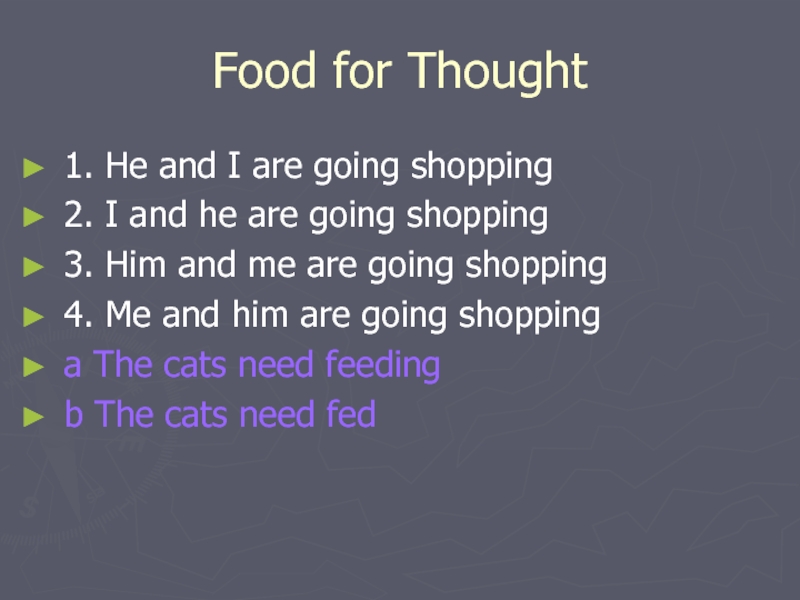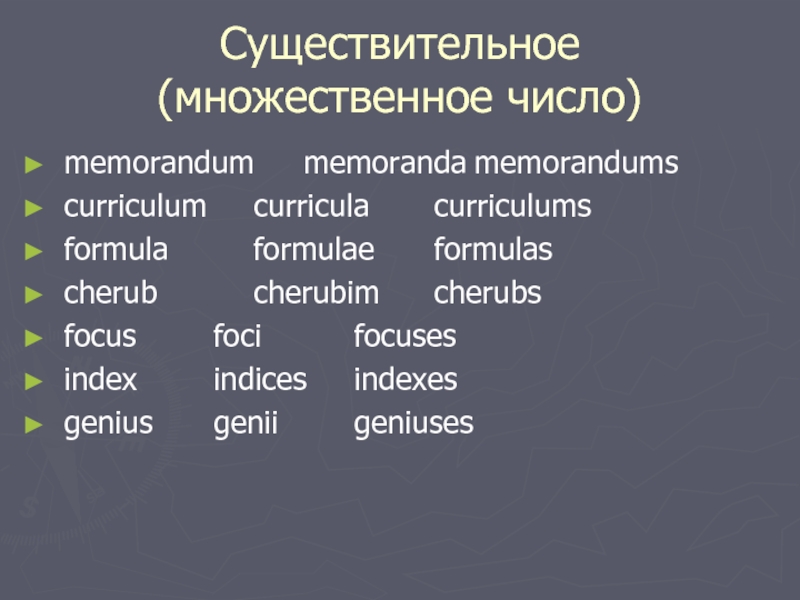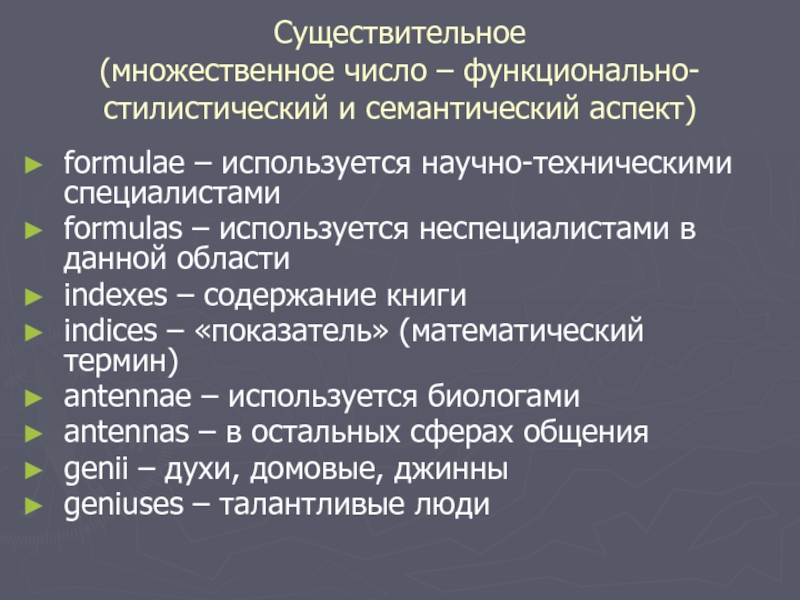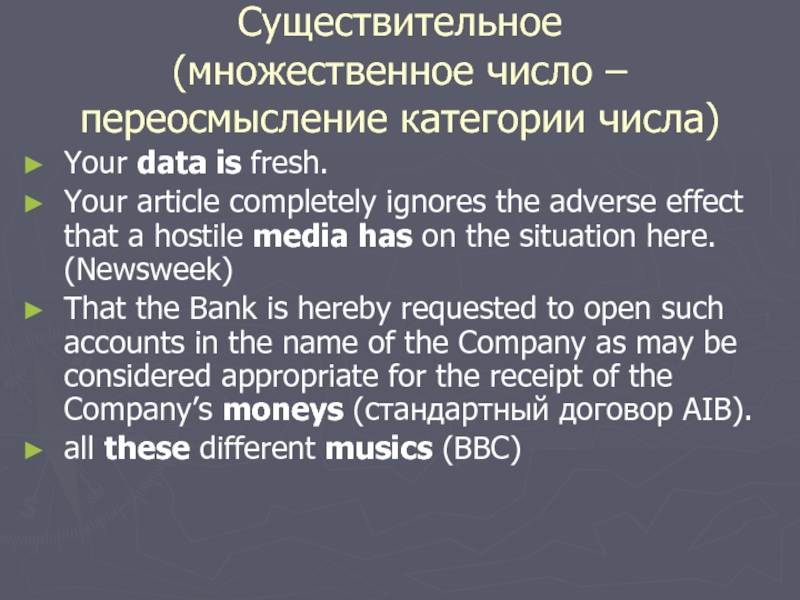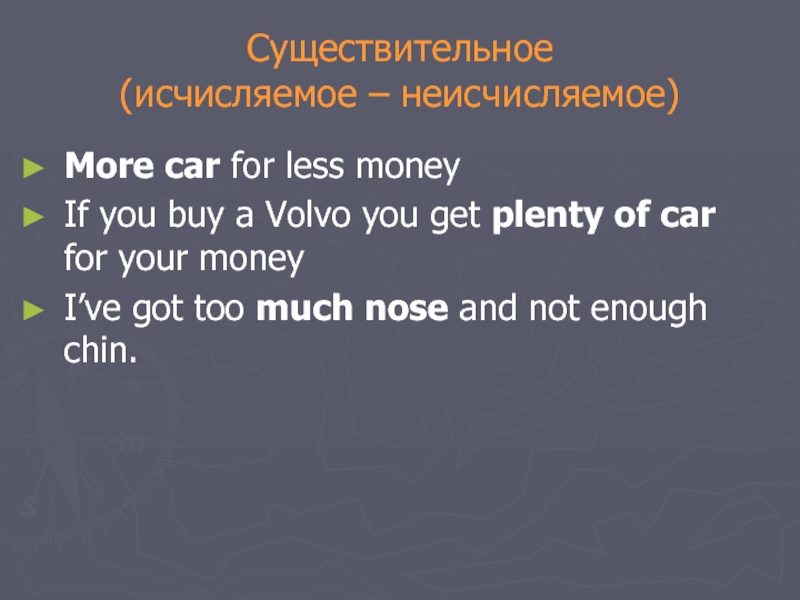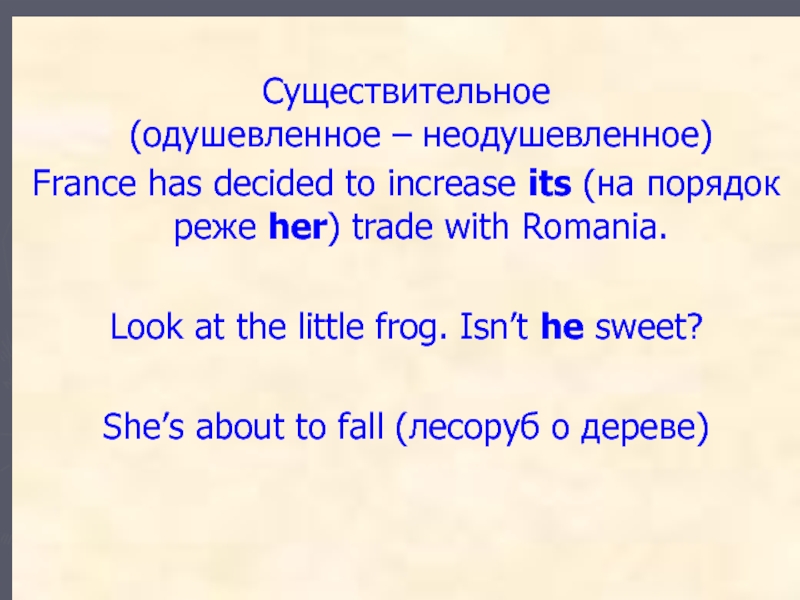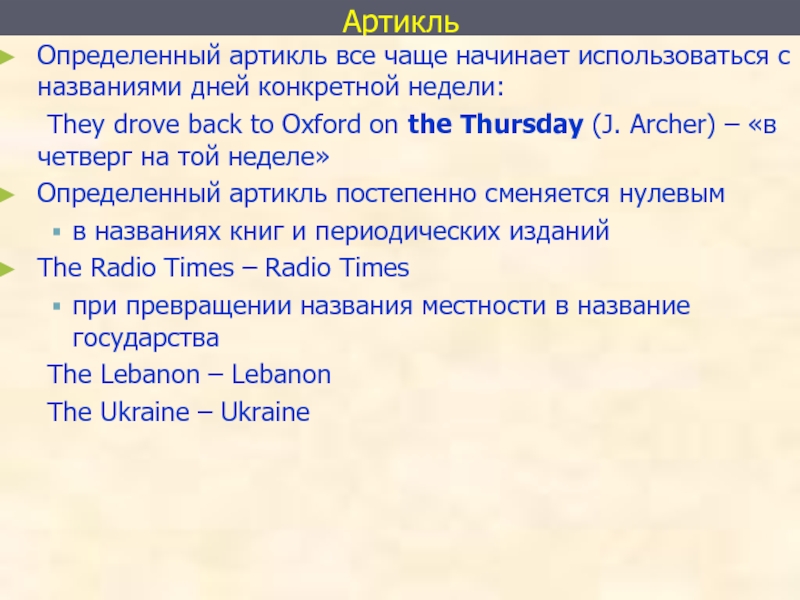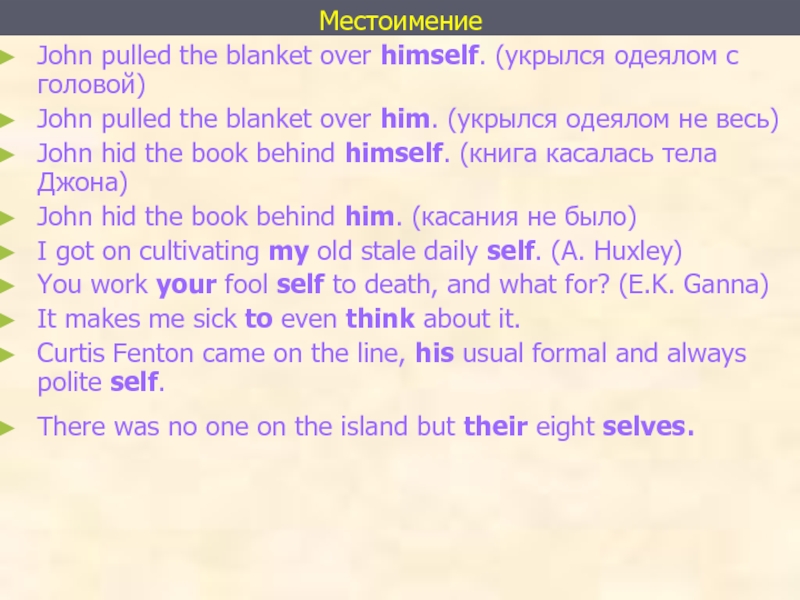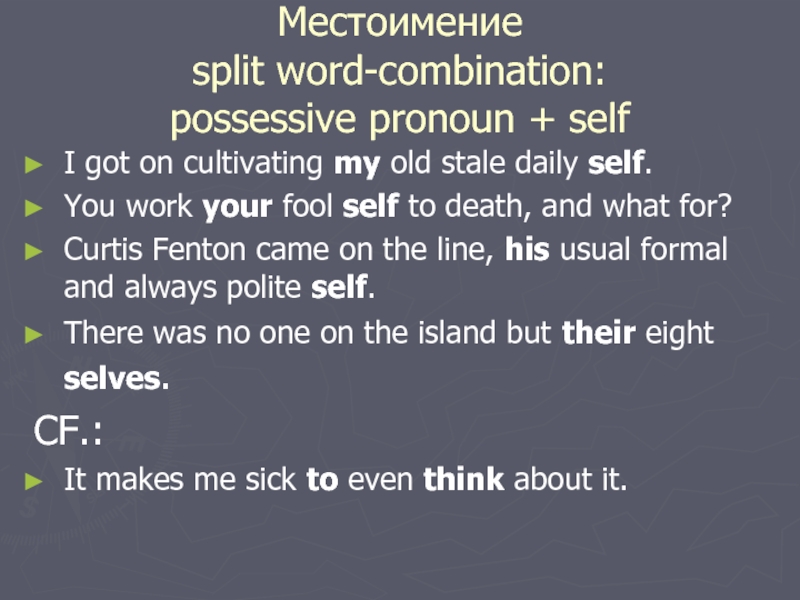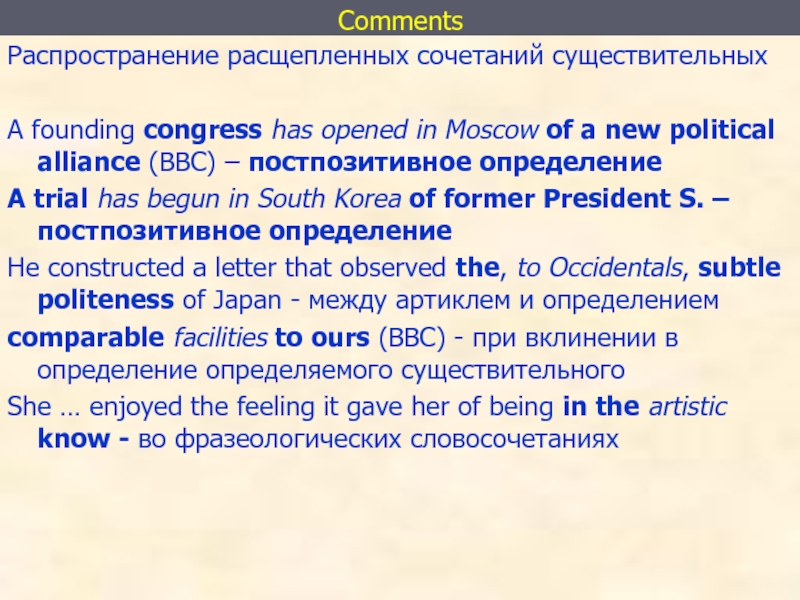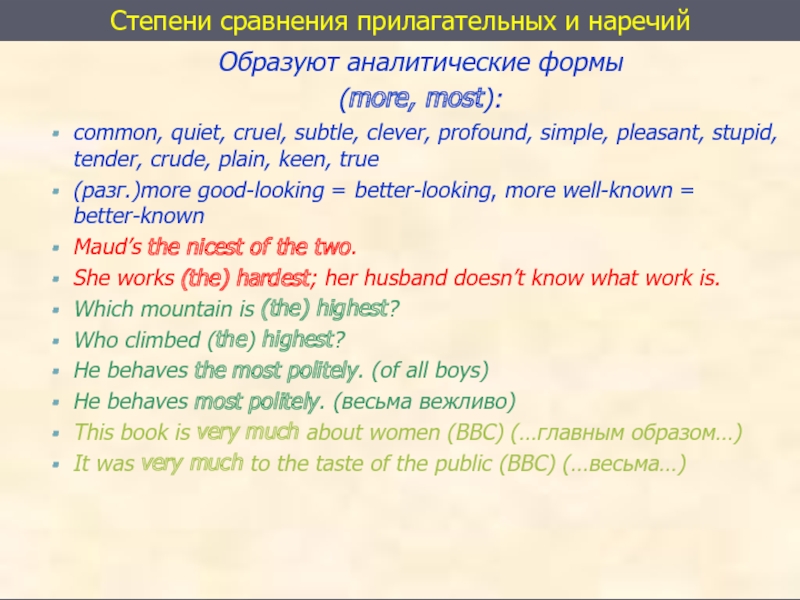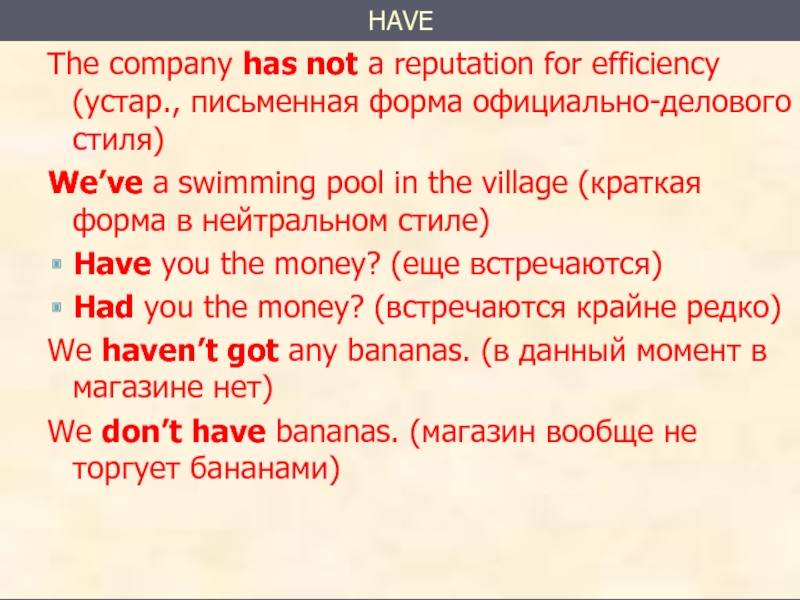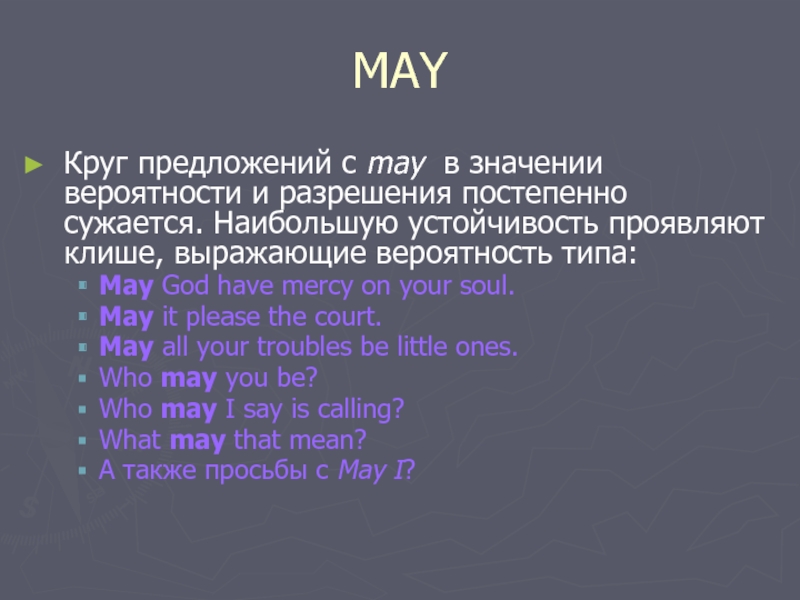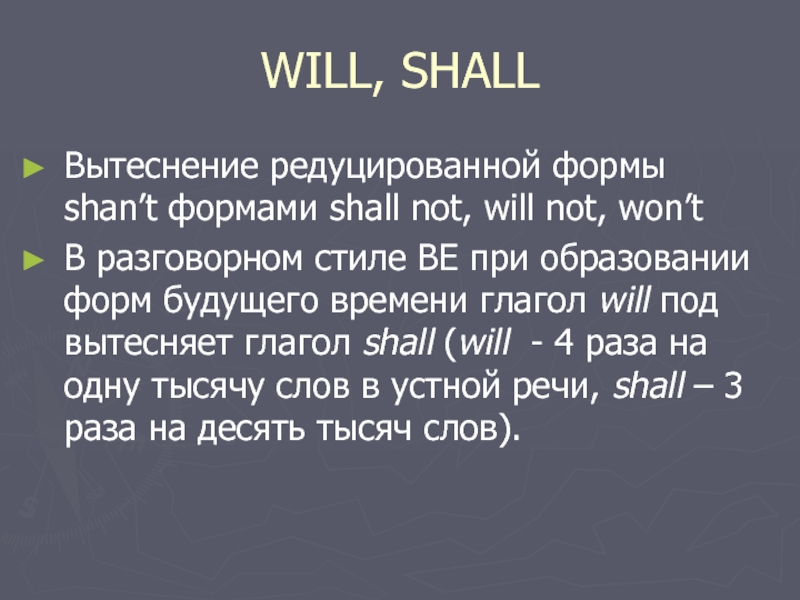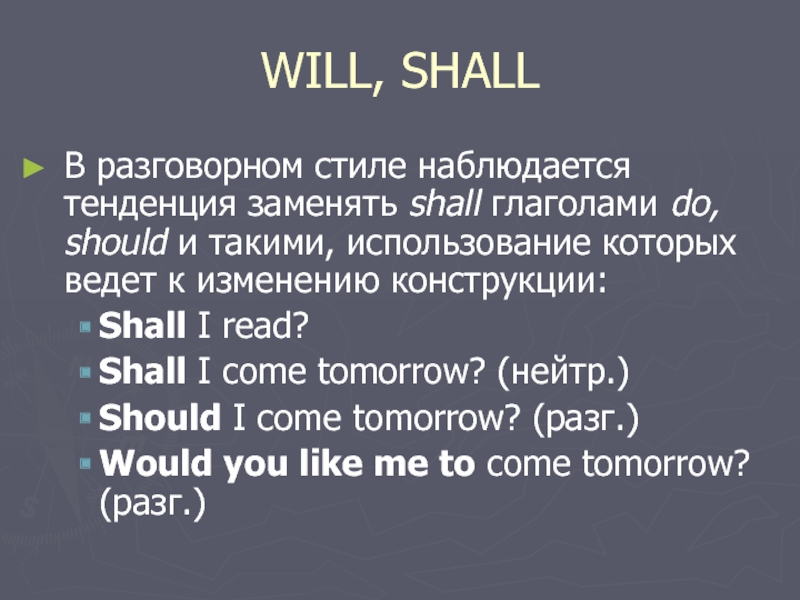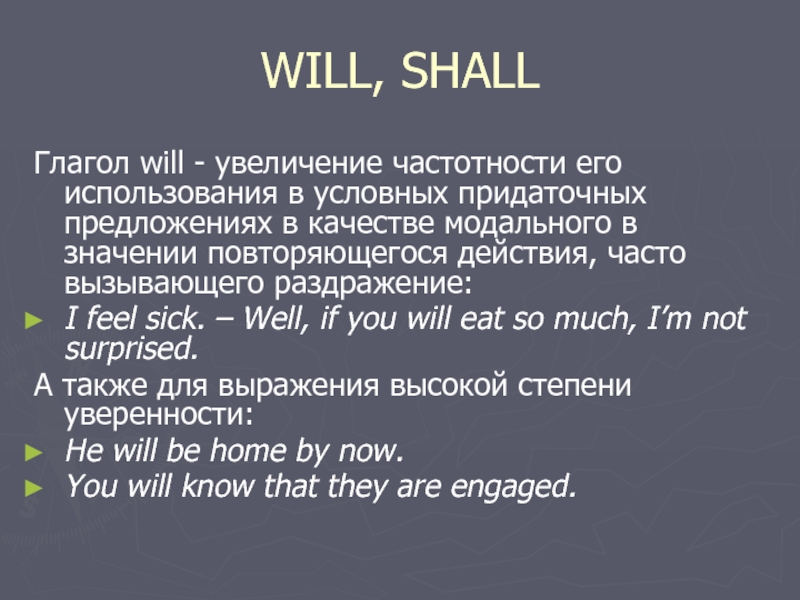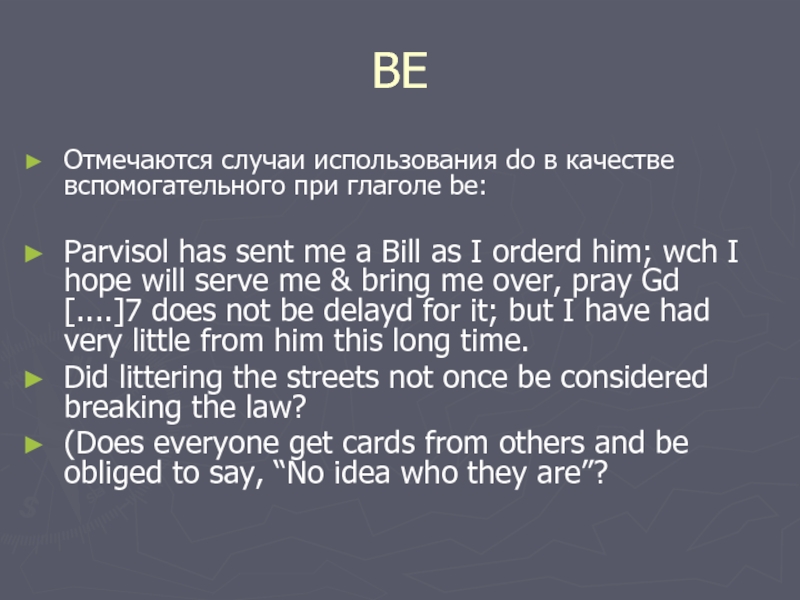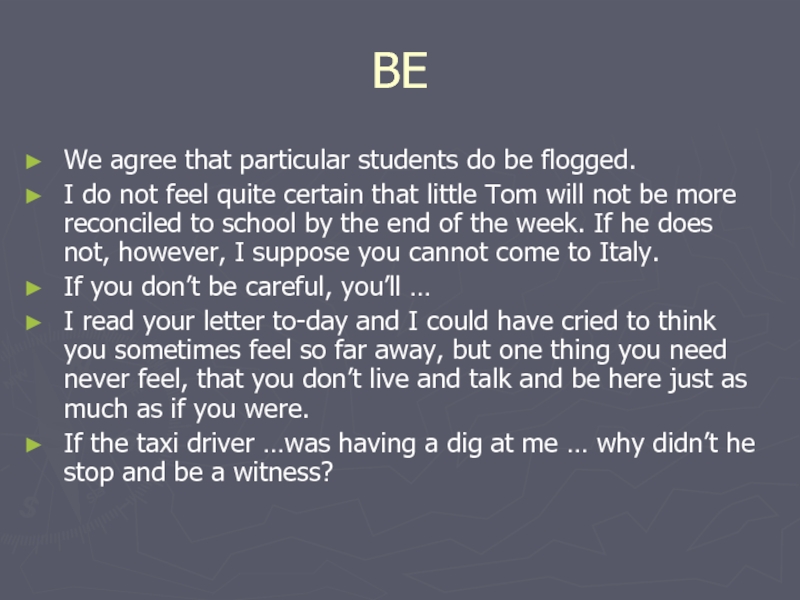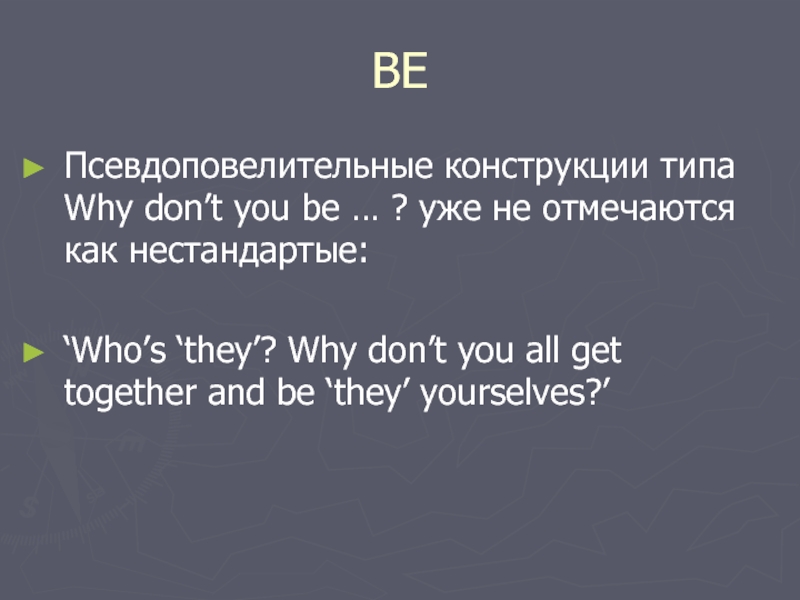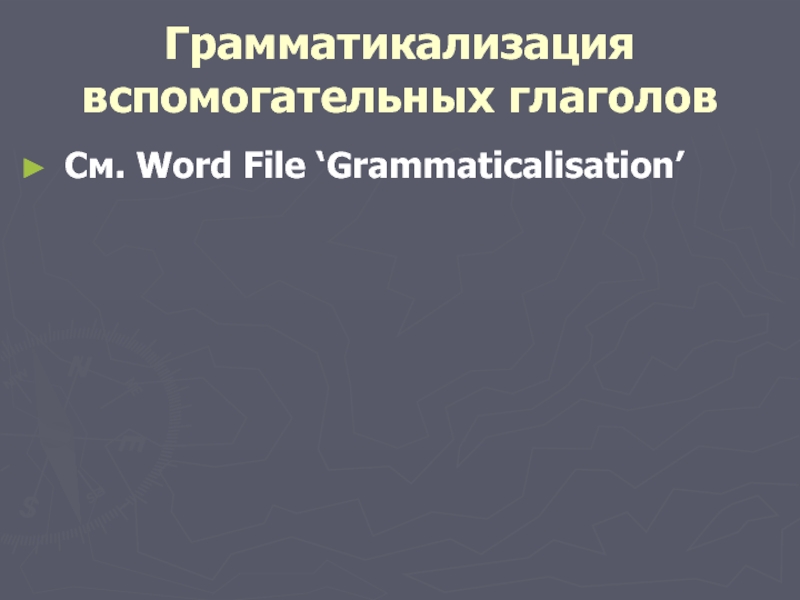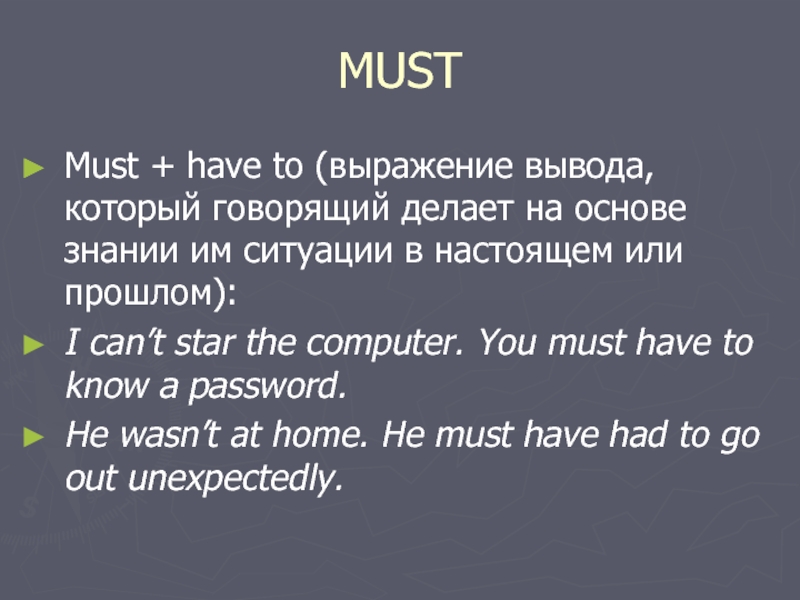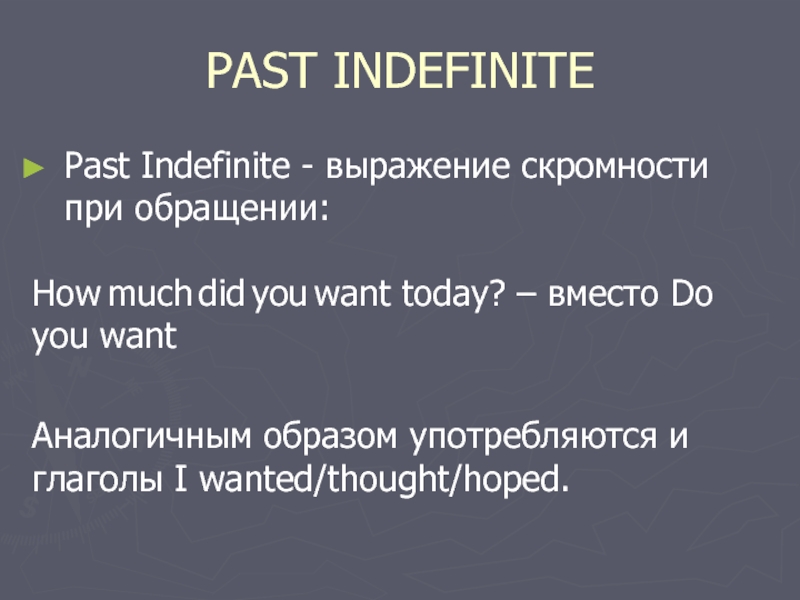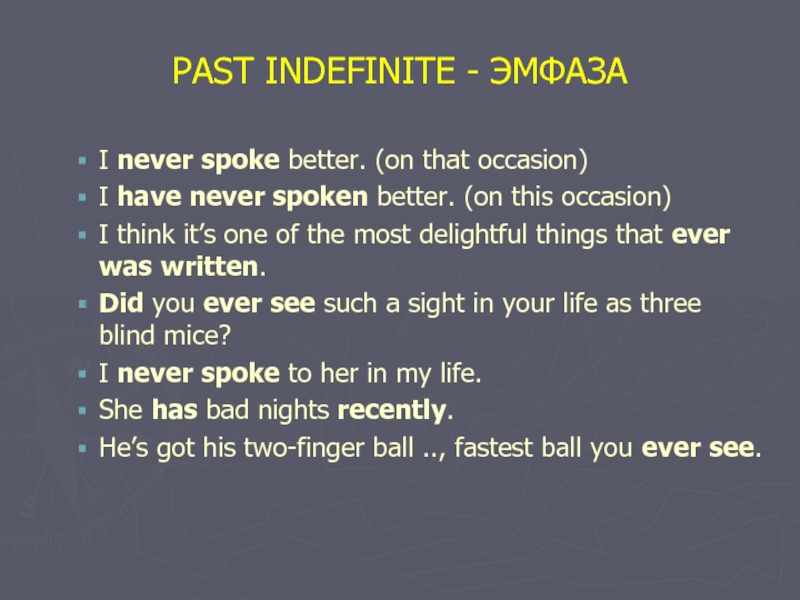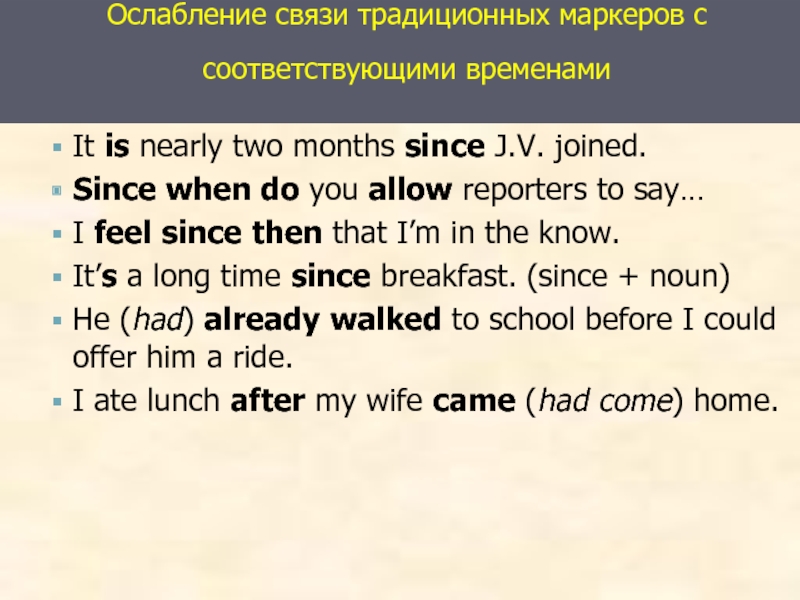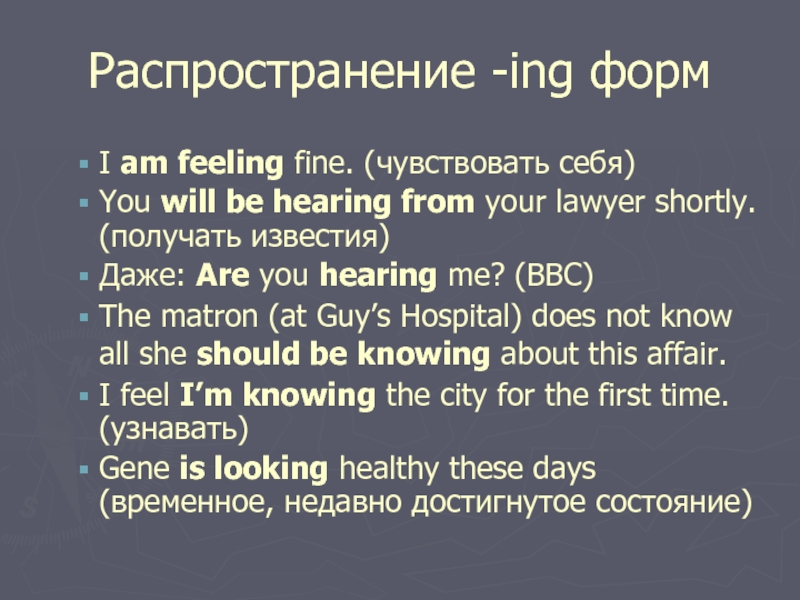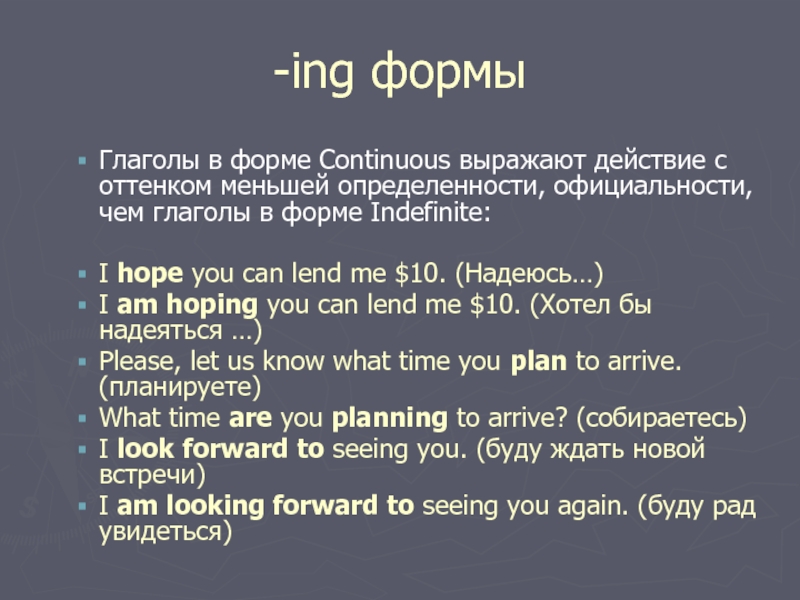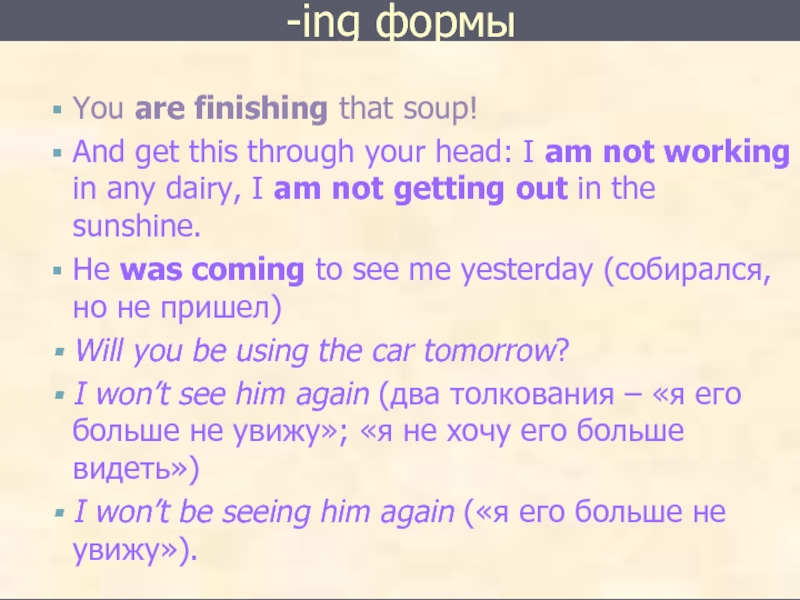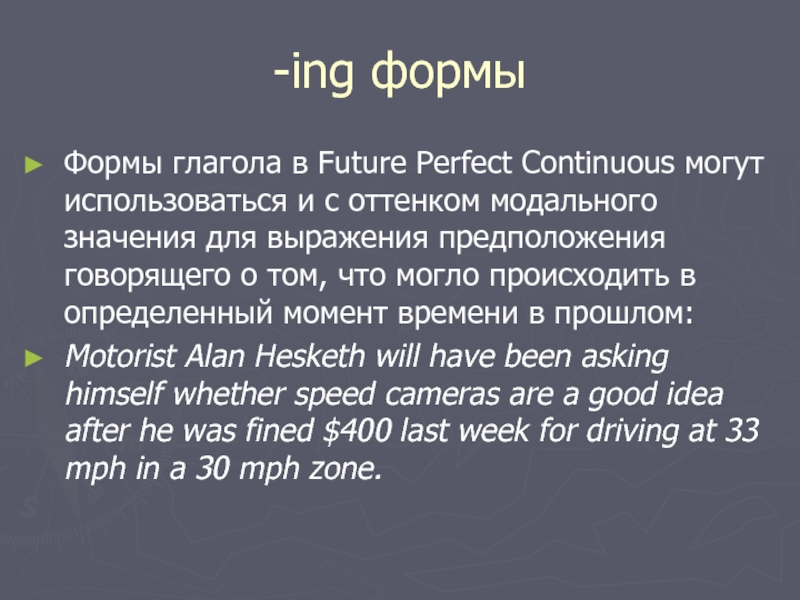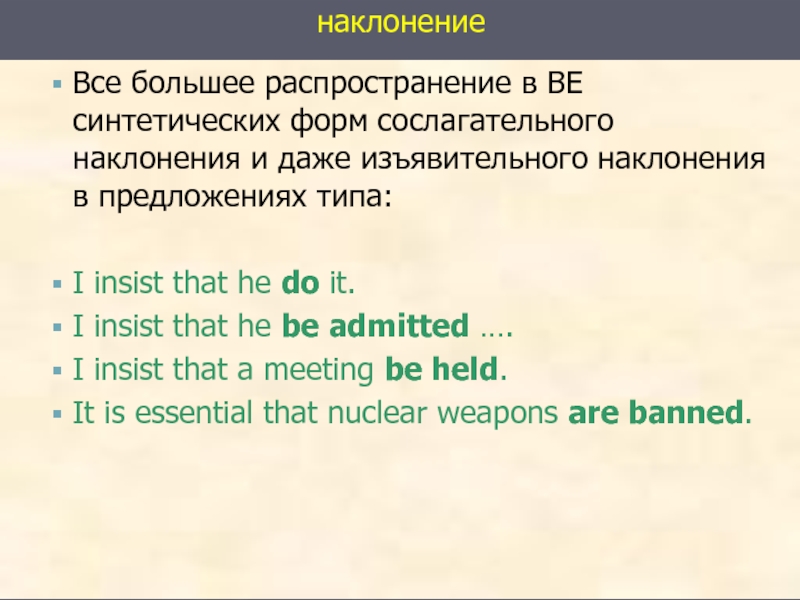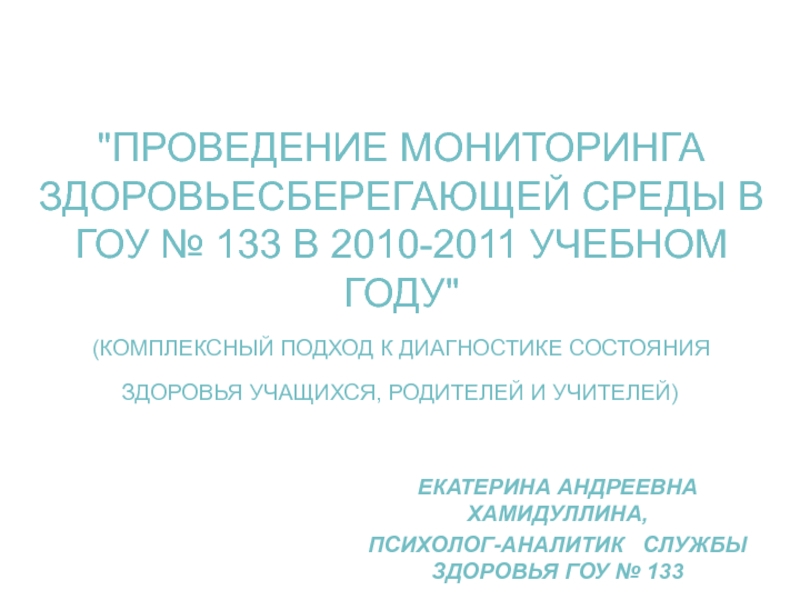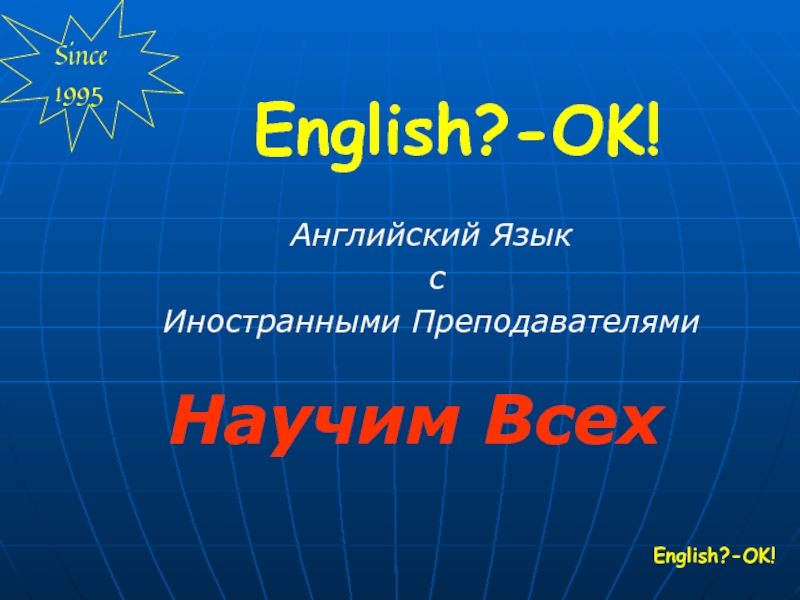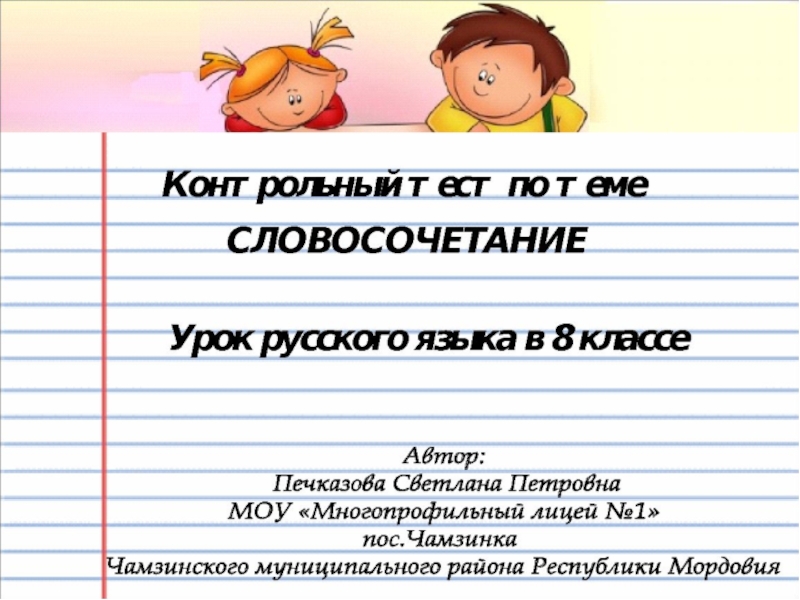- Главная
- Разное
- Дизайн
- Бизнес и предпринимательство
- Аналитика
- Образование
- Развлечения
- Красота и здоровье
- Финансы
- Государство
- Путешествия
- Спорт
- Недвижимость
- Армия
- Графика
- Культурология
- Еда и кулинария
- Лингвистика
- Английский язык
- Астрономия
- Алгебра
- Биология
- География
- Детские презентации
- Информатика
- История
- Литература
- Маркетинг
- Математика
- Медицина
- Менеджмент
- Музыка
- МХК
- Немецкий язык
- ОБЖ
- Обществознание
- Окружающий мир
- Педагогика
- Русский язык
- Технология
- Физика
- Философия
- Химия
- Шаблоны, картинки для презентаций
- Экология
- Экономика
- Юриспруденция
Некоторые тенденции в развитии современной английской грамматики презентация
Содержание
- 1. Некоторые тенденции в развитии современной английской грамматики
- 2. Food for Thought 1. He and I
- 3. Существительное (множественное число) memorandum memoranda memorandums
- 4. Существительное (множественное число – функционально-стилистический и семантический
- 5. Существительное (множественное число – переосмысление категории числа)
- 6. Существительное (исчисляемое – неисчисляемое) More car for
- 7. Существительное
- 8. Артикль Определенный артикль все чаще начинает использоваться
- 9. Местоимение John pulled the blanket over himself.
- 10. Местоимение split word-combination: possessive pronoun + self
- 11. Comments Распространение расщепленных сочетаний существительных
- 12. Местоимение – стилистические расхождения Who do you
- 13. Степени сравнения прилагательных и наречий Образуют аналитические
- 14. HAVE The company has not a reputation
- 15. MAY Круг предложений с may в значении
- 16. WANT You want to take it easy!
- 17. WILL, SHALL Вытеснение редуцированной формы shan’t формами
- 18. WILL, SHALL В разговорном стиле наблюдается тенденция
- 19. WILL, SHALL Глагол will - увеличение частотности
- 20. BE Отмечаются случаи использования do в качестве
- 21. BE We agree that particular students do
- 22. BE Псевдоповелительные конструкции типа Why don’t you
- 23. Грамматикализация вспомогательных глаголов См. Word File ‘Grammaticalisation’
- 24. MUST Must + have to (выражение вывода,
- 25. NEED, HAVE TO needn’t do - отсутствие
- 26. PAST INDEFINITE Past Indefinite - выражение скромности
- 27. PAST INDEFINITE - ЭМФАЗА I never spoke
- 28. Ослабление связи традиционных маркеров с соответствующими временами
- 29. Распространение -ing форм I am feeling fine.
- 30. -ing формы Глаголы в форме Continuous выражают
- 31. -ing формы You are finishing that
- 32. -ing формы Формы глагола в Future Perfect
- 33. наклонение Все большее распространение в BE синтетических
Слайд 2Food for Thought
1. He and I are going shopping
2. I and
he are going shopping
3. Him and me are going shopping
4. Me and him are going shopping
a The cats need feeding
b The cats need fed
3. Him and me are going shopping
4. Me and him are going shopping
a The cats need feeding
b The cats need fed
Слайд 3Существительное
(множественное число)
memorandum memoranda memorandums
curriculum curricula curriculums
formula formulae formulas
cherub cherubim cherubs
focus foci focuses
index indices indexes
genius genii geniuses
Слайд 4Существительное
(множественное число – функционально-стилистический и семантический аспект)
formulae – используется научно-техническими специалистами
formulas
– используется неспециалистами в данной области
indexes – содержание книги
indices – «показатель» (математический термин)
antennae – используется биологами
antennas – в остальных сферах общения
genii – духи, домовые, джинны
geniuses – талантливые люди
indexes – содержание книги
indices – «показатель» (математический термин)
antennae – используется биологами
antennas – в остальных сферах общения
genii – духи, домовые, джинны
geniuses – талантливые люди
Слайд 5Существительное
(множественное число – переосмысление категории числа)
Your data is fresh.
Your article completely
ignores the adverse effect that a hostile media has on the situation here. (Newsweek)
That the Bank is hereby requested to open such accounts in the name of the Company as may be considered appropriate for the receipt of the Company’s moneys (стандартный договор AIB).
all these different musics (BBC)
That the Bank is hereby requested to open such accounts in the name of the Company as may be considered appropriate for the receipt of the Company’s moneys (стандартный договор AIB).
all these different musics (BBC)
Слайд 6Существительное
(исчисляемое – неисчисляемое)
More car for less money
If you buy a Volvo
you get plenty of car for your money
I’ve got too much nose and not enough chin.
I’ve got too much nose and not enough chin.
Слайд 7
Существительное
(одушевленное – неодушевленное)
France has decided to increase its (на порядок
реже her) trade with Romania.
Look at the little frog. Isn’t he sweet?
She’s about to fall (лесоруб о дереве)
Look at the little frog. Isn’t he sweet?
She’s about to fall (лесоруб о дереве)
Слайд 8Артикль
Определенный артикль все чаще начинает использоваться с названиями дней конкретной недели:
They
drove back to Oxford on the Thursday (J. Archer) – «в четверг на той неделе»
Определенный артикль постепенно сменяется нулевым
в названиях книг и периодических изданий
The Radio Times – Radio Times
при превращении названия местности в название государства
The Lebanon – Lebanon
The Ukraine – Ukraine
Определенный артикль постепенно сменяется нулевым
в названиях книг и периодических изданий
The Radio Times – Radio Times
при превращении названия местности в название государства
The Lebanon – Lebanon
The Ukraine – Ukraine
Слайд 9Местоимение
John pulled the blanket over himself. (укрылся одеялом с головой)
John pulled
the blanket over him. (укрылся одеялом не весь)
John hid the book behind himself. (книга касалась тела Джона)
John hid the book behind him. (касания не было)
I got on cultivating my old stale daily self. (A. Huxley)
You work your fool self to death, and what for? (E.K. Ganna)
It makes me sick to even think about it.
Curtis Fenton came on the line, his usual formal and always polite self.
There was no one on the island but their eight selves.
John hid the book behind himself. (книга касалась тела Джона)
John hid the book behind him. (касания не было)
I got on cultivating my old stale daily self. (A. Huxley)
You work your fool self to death, and what for? (E.K. Ganna)
It makes me sick to even think about it.
Curtis Fenton came on the line, his usual formal and always polite self.
There was no one on the island but their eight selves.
Слайд 10Местоимение
split word-combination:
possessive pronoun + self
I got on cultivating my old stale
daily self.
You work your fool self to death, and what for?
Curtis Fenton came on the line, his usual formal and always polite self.
There was no one on the island but their eight selves.
CF.:
It makes me sick to even think about it.
You work your fool self to death, and what for?
Curtis Fenton came on the line, his usual formal and always polite self.
There was no one on the island but their eight selves.
CF.:
It makes me sick to even think about it.
Слайд 11Comments
Распространение расщепленных сочетаний существительных
A founding congress has opened in Moscow
of a new political alliance (BBC) – постпозитивное определение
A trial has begun in South Korea of former President S. – постпозитивное определение
He constructed a letter that observed the, to Occidentals, subtle politeness of Japan - между артиклем и определением
comparable facilities to ours (BBC) - при вклинении в определение определяемого существительного
She … enjoyed the feeling it gave her of being in the artistic know - во фразеологических словосочетаниях
A trial has begun in South Korea of former President S. – постпозитивное определение
He constructed a letter that observed the, to Occidentals, subtle politeness of Japan - между артиклем и определением
comparable facilities to ours (BBC) - при вклинении в определение определяемого существительного
She … enjoyed the feeling it gave her of being in the artistic know - во фразеологических словосочетаниях
Слайд 12Местоимение – стилистические расхождения
Who do you want to save? (разговорный и
нейтральный)
Whom do you suggest should do it? (do you think/suppose) – разговорный стиль
Who knows the answer? (= Кто-нибудь знает ответ?)
Who know the answer? (= Кто из вас знает ответ?)
Neither of us likes him. (нейтр.)
Neither of us like him. (разг.)
Each girl wore what she liked best. (нейтр.)
Each girl wore what they liked best. (разг.)
Each of them explained it in his/her own way. (нейтр.)
Each of them explained it in their own way. (разг.)
No one could have blamed themselves for that. (разг.)
Whom do you suggest should do it? (do you think/suppose) – разговорный стиль
Who knows the answer? (= Кто-нибудь знает ответ?)
Who know the answer? (= Кто из вас знает ответ?)
Neither of us likes him. (нейтр.)
Neither of us like him. (разг.)
Each girl wore what she liked best. (нейтр.)
Each girl wore what they liked best. (разг.)
Each of them explained it in his/her own way. (нейтр.)
Each of them explained it in their own way. (разг.)
No one could have blamed themselves for that. (разг.)
Слайд 13Степени сравнения прилагательных и наречий
Образуют аналитические формы
(more, most):
common, quiet, cruel,
subtle, clever, profound, simple, pleasant, stupid, tender, crude, plain, keen, true
(разг.)more good-looking = better-looking, more well-known = better-known
Maud’s the nicest of the two.
She works (the) hardest; her husband doesn’t know what work is.
Which mountain is (the) highest?
Who climbed (the) highest?
He behaves the most politely. (of all boys)
He behaves most politely. (весьма вежливо)
This book is very much about women (BBC) (…главным образом…)
It was very much to the taste of the public (BBC) (…весьма…)
(разг.)more good-looking = better-looking, more well-known = better-known
Maud’s the nicest of the two.
She works (the) hardest; her husband doesn’t know what work is.
Which mountain is (the) highest?
Who climbed (the) highest?
He behaves the most politely. (of all boys)
He behaves most politely. (весьма вежливо)
This book is very much about women (BBC) (…главным образом…)
It was very much to the taste of the public (BBC) (…весьма…)
Слайд 14HAVE
The company has not a reputation for efficiency (устар., письменная форма
официально-делового стиля)
We’ve a swimming pool in the village (краткая форма в нейтральном стиле)
Have you the money? (еще встречаются)
Had you the money? (встречаются крайне редко)
We haven’t got any bananas. (в данный момент в магазине нет)
We don’t have bananas. (магазин вообще не торгует бананами)
We’ve a swimming pool in the village (краткая форма в нейтральном стиле)
Have you the money? (еще встречаются)
Had you the money? (встречаются крайне редко)
We haven’t got any bananas. (в данный момент в магазине нет)
We don’t have bananas. (магазин вообще не торгует бананами)
Слайд 15MAY
Круг предложений с may в значении вероятности и разрешения постепенно сужается.
Наибольшую устойчивость проявляют клише, выражающие вероятность типа:
May God have mercy on your soul.
May it please the court.
May all your troubles be little ones.
Who may you be?
Who may I say is calling?
What may that mean?
А также просьбы с May I?
May God have mercy on your soul.
May it please the court.
May all your troubles be little ones.
Who may you be?
Who may I say is calling?
What may that mean?
А также просьбы с May I?
Слайд 16WANT
You want to take it easy! (формирование у глагола want модального
оттенка, разговорный стиль)
Слайд 17WILL, SHALL
Вытеснение редуцированной формы shan’t формами shall not, will not, won’t
В
разговорном стиле BE при образовании форм будущего времени глагол will под вытесняет глагол shall (will - 4 раза на одну тысячу слов в устной речи, shall – 3 раза на десять тысяч слов).
Слайд 18WILL, SHALL
В разговорном стиле наблюдается тенденция заменять shall глаголами do, should
и такими, использование которых ведет к изменению конструкции:
Shall I read?
Shall I come tomorrow? (нейтр.)
Should I come tomorrow? (разг.)
Would you like me to come tomorrow? (разг.)
Shall I read?
Shall I come tomorrow? (нейтр.)
Should I come tomorrow? (разг.)
Would you like me to come tomorrow? (разг.)
Слайд 19WILL, SHALL
Глагол will - увеличение частотности его использования в условных придаточных
предложениях в качестве модального в значении повторяющегося действия, часто вызывающего раздражение:
I feel sick. – Well, if you will eat so much, I’m not surprised.
А также для выражения высокой степени уверенности:
He will be home by now.
You will know that they are engaged.
I feel sick. – Well, if you will eat so much, I’m not surprised.
А также для выражения высокой степени уверенности:
He will be home by now.
You will know that they are engaged.
Слайд 20BE
Отмечаются случаи использования do в качестве вспомогательного при глаголе be:
Parvisol has
sent me a Bill as I orderd him; wch I hope will serve me & bring me over, pray Gd [....]7 does not be delayd for it; but I have had very little from him this long time.
Did littering the streets not once be considered breaking the law?
(Does everyone get cards from others and be obliged to say, “No idea who they are”?
Did littering the streets not once be considered breaking the law?
(Does everyone get cards from others and be obliged to say, “No idea who they are”?
Слайд 21BE
We agree that particular students do be flogged.
I do not feel
quite certain that little Tom will not be more reconciled to school by the end of the week. If he does not, however, I suppose you cannot come to Italy.
If you don’t be careful, you’ll …
I read your letter to-day and I could have cried to think you sometimes feel so far away, but one thing you need never feel, that you don’t live and talk and be here just as much as if you were.
If the taxi driver …was having a dig at me … why didn’t he stop and be a witness?
If you don’t be careful, you’ll …
I read your letter to-day and I could have cried to think you sometimes feel so far away, but one thing you need never feel, that you don’t live and talk and be here just as much as if you were.
If the taxi driver …was having a dig at me … why didn’t he stop and be a witness?
Слайд 22BE
Псевдоповелительные конструкции типа Why don’t you be … ? уже не
отмечаются как нестандартые:
‘Who’s ‘they’? Why don’t you all get together and be ‘they’ yourselves?’
‘Who’s ‘they’? Why don’t you all get together and be ‘they’ yourselves?’
Слайд 24MUST
Must + have to (выражение вывода, который говорящий делает на основе
знании им ситуации в настоящем или прошлом):
I can’t star the computer. You must have to know a password.
He wasn’t at home. He must have had to go out unexpectedly.
I can’t star the computer. You must have to know a password.
He wasn’t at home. He must have had to go out unexpectedly.
Слайд 25NEED, HAVE TO
needn’t do - отсутствие необходимости, обусловленное решением говорящего
don’t have
to do - отсутствие необходимости, обусловленное либо внешними не зависящими от говорящего обстоятельствами, либо решением об отсутствии необходимости, принятым другим лицом:
As you worked late yesterday you needn’t come in until 10.00 tomorrow morning (решение говорящего)
We’ve been told that we don’t have to be at work until 10.00 tomorrow (ссылка на решение другого лица)
As you worked late yesterday you needn’t come in until 10.00 tomorrow morning (решение говорящего)
We’ve been told that we don’t have to be at work until 10.00 tomorrow (ссылка на решение другого лица)
Слайд 26PAST INDEFINITE
Past Indefinite - выражение скромности при обращении:
How much did you
want today? – вместо Do you want
Аналогичным образом употребляются и глаголы I wanted/thought/hoped.
Аналогичным образом употребляются и глаголы I wanted/thought/hoped.
Слайд 27PAST INDEFINITE - ЭМФАЗА
I never spoke better. (on that occasion)
I have
never spoken better. (on this occasion)
I think it’s one of the most delightful things that ever was written.
Did you ever see such a sight in your life as three blind mice?
I never spoke to her in my life.
She has bad nights recently.
He’s got his two-finger ball .., fastest ball you ever see.
I think it’s one of the most delightful things that ever was written.
Did you ever see such a sight in your life as three blind mice?
I never spoke to her in my life.
She has bad nights recently.
He’s got his two-finger ball .., fastest ball you ever see.
Слайд 28Ослабление связи традиционных маркеров с соответствующими временами
It is nearly two
months since J.V. joined.
Since when do you allow reporters to say…
I feel since then that I’m in the know.
It’s a long time since breakfast. (since + noun)
He (had) already walked to school before I could offer him a ride.
I ate lunch after my wife came (had come) home.
Since when do you allow reporters to say…
I feel since then that I’m in the know.
It’s a long time since breakfast. (since + noun)
He (had) already walked to school before I could offer him a ride.
I ate lunch after my wife came (had come) home.
Слайд 29Распространение -ing форм
I am feeling fine. (чувствовать себя)
You will be hearing
from your lawyer shortly. (получать известия)
Даже: Are you hearing me? (BBC)
The matron (at Guy’s Hospital) does not know all she should be knowing about this affair.
I feel I’m knowing the city for the first time. (узнавать)
Gene is looking healthy these days (временное, недавно достигнутое состояние)
Даже: Are you hearing me? (BBC)
The matron (at Guy’s Hospital) does not know all she should be knowing about this affair.
I feel I’m knowing the city for the first time. (узнавать)
Gene is looking healthy these days (временное, недавно достигнутое состояние)
Слайд 30-ing формы
Глаголы в форме Continuous выражают действие с оттенком меньшей определенности,
официальности, чем глаголы в форме Indefinite:
I hope you can lend me $10. (Надеюсь…)
I am hoping you can lend me $10. (Хотел бы надеяться …)
Please, let us know what time you plan to arrive. (планируете)
What time are you planning to arrive? (собираетесь)
I look forward to seeing you. (буду ждать новой встречи)
I am looking forward to seeing you again. (буду рад увидеться)
I hope you can lend me $10. (Надеюсь…)
I am hoping you can lend me $10. (Хотел бы надеяться …)
Please, let us know what time you plan to arrive. (планируете)
What time are you planning to arrive? (собираетесь)
I look forward to seeing you. (буду ждать новой встречи)
I am looking forward to seeing you again. (буду рад увидеться)
Слайд 31-ing формы
You are finishing that soup!
And get this through your head:
I am not working in any dairy, I am not getting out in the sunshine.
He was coming to see me yesterday (собирался, но не пришел)
Will you be using the car tomorrow?
I won’t see him again (два толкования – «я его больше не увижу»; «я не хочу его больше видеть»)
I won’t be seeing him again («я его больше не увижу»).
He was coming to see me yesterday (собирался, но не пришел)
Will you be using the car tomorrow?
I won’t see him again (два толкования – «я его больше не увижу»; «я не хочу его больше видеть»)
I won’t be seeing him again («я его больше не увижу»).
Слайд 32-ing формы
Формы глагола в Future Perfect Continuous могут использоваться и с
оттенком модального значения для выражения предположения говорящего о том, что могло происходить в определенный момент времени в прошлом:
Motorist Alan Hesketh will have been asking himself whether speed cameras are a good idea after he was fined $400 last week for driving at 33 mph in a 30 mph zone.
Motorist Alan Hesketh will have been asking himself whether speed cameras are a good idea after he was fined $400 last week for driving at 33 mph in a 30 mph zone.
Слайд 33наклонение
Все большее распространение в BE синтетических форм сослагательного наклонения и даже
изъявительного наклонения в предложениях типа:
I insist that he do it.
I insist that he be admitted ….
I insist that a meeting be held.
It is essential that nuclear weapons are banned.
I insist that he do it.
I insist that he be admitted ….
I insist that a meeting be held.
It is essential that nuclear weapons are banned.

